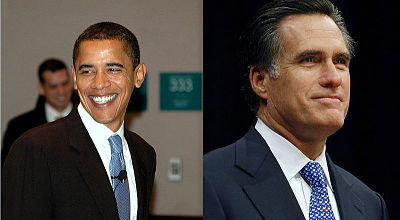Who Will Millennials Choose for President?
Four years after younger voters headed to the polls in record numbers, helping to send then-Sen. Barack Obama to the White House, a new national survey of more than 2,000 18- to 24-year old Millennials provides new insights about the challenges both Obama and Mitt Romney face in reaching the newest group of young American voters.
Conducted jointly by Public Religion Research Institute and the Berkley Center for Religion, Peace, and World Affairs at Georgetown University, the new poll finds Obama holds a seven-point lead over a generic Republican candidate, with 48 percent of young Millennial voters saying they would prefer that Obama win the 2012 election, compared to 41 percent who say they would like to see a Republican win.
However, only 34 percent of voters who would prefer a Republican candidate say Mitt Romney is their first choice to be the GOP nominee. Another challenge for both campaigns is that the PRRI/Berkley Center poll also finds that only 61 percent of college-age Millennials are currently registered to vote, and only 46 percent say they are absolutely certain they will vote in November.
“Both the Romney and Obama campaigns have their work cut out for them to reach college-age Millennial voters,” says Robert Jones, CEO of Public Religion Research Institute. “Obama enjoys significant favorability and excitement advantages over Romney, but his support among younger voters today is substantially lower than among younger voters four years ago. Romney’s largest challenge is that he inspires considerably less excitement than Obama or other Republican candidates.”
Among the issues Millennials believe are critically important, 76 percent cite jobs and unemployment, followed by the federal deficit (55 percent) and education (54 percent). Only 22 percent say social issues like abortion or same-sex marriage are critical.
“College-age Millennials are also notable for their support for economic reforms that address the gap between the rich and the poor,” said Daniel Cox, Research Director at Public Religion Research Institute. “More than 6-in-10 Millennials say that one of the biggest problems in this country is that we don’t give everyone an equal chance in life.”
Sixty-nine percent of Millennials believe that the government should do more to reduce the gap between the rich and the poor, while 28 percent disagree. Younger Millennials also strongly favor (72 percent) a policy sometimes called the “Buffett Rule,” which would increase the tax rate on Americans earning more than $1 million a year. But Millennials also show some concerns about the role of government. Two-thirds agree that poor people have become too dependent on government assistance programs.
“Despite the value Millennials place on tolerance, they remain divided on issues of race,” says Thomas Banchoff, director, Berkley Center, and associate professor of government at Georgetown University.
When asked whether discrimination against whites has become as big a problem today as discrimination against blacks and other minorities, younger Millennials are nearly evenly divided. A solid majority (58 percent) of white Millennials believe that discrimination against whites has become as big a problem as discrimination against blacks and other minorities, compared to only 24 percent of black Millennials and 39 percent Hispanic Millennials. College-age Millennials are also divided on whether the government has paid too much attention to the problems of blacks and other minorities over the past few decades.






































